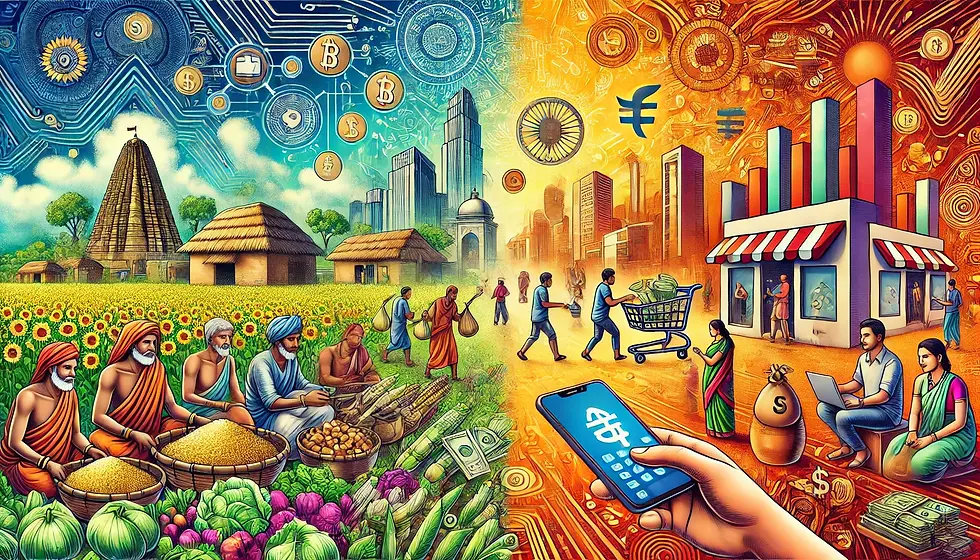The Benefits of Barter: How to Exchange Goods in Today’s Cashless Society
- bxiworldwebsite
- Oct 24, 2024
- 4 min read
In today’s fast-paced, digital economy, cash transactions are no longer the only way to acquire goods or services. One alternative that’s gaining renewed popularity is the age-old practice of bartering. While it may seem like a relic of ancient times, barter exchange has evolved into a viable, modern solution for individuals and businesses looking to exchange goods without involving money.
In this blog, we’ll explore the benefits of barter exchange and how you can leverage it in today’s cashless society, with a particular focus on Barter Exchange in India.
What Is Barter Exchange?

Barter exchange is the act of trading goods or services directly between parties without the use of money. Instead of relying on a currency system, people negotiate the value of their items and swap them based on mutual need. For example, if you have a surplus of handmade furniture and need fresh produce, you could find a farmer willing to trade some of their crops for one of your pieces.
Historically, bartering was the earliest form of commerce. In recent years, the concept has been revitalized as people seek alternatives to the money-based economy, especially in cash-strapped situations. Barter exchange goods without involving money is a win-win solution that is growing in popularity across the globe.
The Benefits of Barter Exchange
Saving Money One of the most obvious benefits of barter exchange is that it eliminates the need for cash. For businesses, this means conserving capital while still acquiring the goods or services they need. Individuals, especially those facing tight budgets, can also benefit from trading items they no longer need in exchange for something useful.
Building Community Connections Bartering fosters stronger community bonds. By engaging in barter exchange, individuals and businesses build trust and cooperation. People are more likely to support one another when they’re involved in a barter network, whether locally or online. For instance, local barter exchanges in India have been instrumental in helping small businesses thrive by trading goods and services without financial transactions.
Reducing Waste and Promoting Sustainability In today’s consumer-driven society, we accumulate many items we don’t need, which often end up in landfills. Barter exchange provides a sustainable way to rehome goods that would otherwise go to waste. This promotes recycling, reuse, and a circular economy, contributing to environmental sustainability. By choosing to barter, you’re actively reducing your carbon footprint.
Enhancing Flexibility in Transactions Barter transactions can be highly flexible. Unlike traditional buying and selling, where the price is fixed, barter negotiations allow both parties to come to an agreement on the relative value of the goods or services. This flexibility ensures that each party feels satisfied with the exchange.
Access to Unique Goods and Services Often, bartering opens doors to acquiring unique items or services that may not be readily available in the cash market. Whether it’s a handmade craft, a personalized service, or a specialized skill, barter exchange offers a creative way to access things you may not otherwise consider purchasing with money.
READ MORE BLOG :- The Difference Between Barter Exchange and Money Exchange
How to Engage in Barter Exchange
Thanks to technology, barter exchange is easier than ever. You can find online platforms and local networks that facilitate trades between individuals and businesses. These platforms often offer a wide range of categories for items or services you can barter, making the process convenient and efficient.
Here’s how to get started:
Identify What You Have and What You Need The first step is to make a list of items or services you have to offer and a list of what you need in return. Be clear about the value of your goods and services to negotiate effectively.
Find Barter Networks or Platforms There are numerous online platforms and community-based networks dedicated to barter exchange. For example, in India, barter exchange communities are growing, allowing people to trade goods without involving money. Platforms such as OLX and dedicated barter apps are great places to start.
Negotiate and Make the Exchange Once you’ve found a potential barter partner, the next step is to negotiate. Ensure that both parties agree on the relative value of the items or services being exchanged. Trust and transparency are key to making sure both sides benefit from the transaction.
Stay Organized If you engage in multiple barters, it’s important to keep track of your exchanges. This will help you manage your trades efficiently and ensure that you’re fulfilling your end of the deal.
Barter Exchange in India
Barter exchange in India is seeing a resurgence as more people and businesses embrace cashless transactions. While the practice is centuries old in the country, it has taken on new life with the advent of digital platforms. In rural areas, barter remains a common way of exchanging goods like crops, livestock, and handmade products. In urban centers, barter is now being utilized by small businesses, freelancers, and entrepreneurs to reduce costs and expand networks.
Platforms such as LocalCircles, various community-driven social media groups, and niche apps have made it easier to connect with others who are interested in barter exchange goods without involving money. This trend has become particularly valuable during economic downturns when liquidity is low but trade and commerce still need to occur.
Why Barter Exchange Is Ideal for Today’s Cashless Society
As more economies shift towards cashless transactions, barter exchange stands out as an attractive alternative. With digital currencies and online transactions already dominating the marketplace, it’s easier than ever to facilitate a barter transaction. In fact, bartering complements a cashless society by offering a flexible, sustainable way to exchange goods and services, especially in situations where cash isn’t readily available or preferred.
Conclusion
Barter exchange is more than just an ancient trading system; it’s a relevant and practical solution for today’s cashless society. Whether you're looking to save money, build stronger community connections, or promote sustainability, bartering offers numerous advantages over traditional money-based transactions. With the growing number of platforms and networks available, it’s never been easier to engage in barter exchange goods without involving money, especially in countries like India where the practice is deeply rooted.
So, the next time you find yourself in need of goods or services, consider bartering—you might be surprised by what you can trade and the connections you’ll make along the way!




Comments